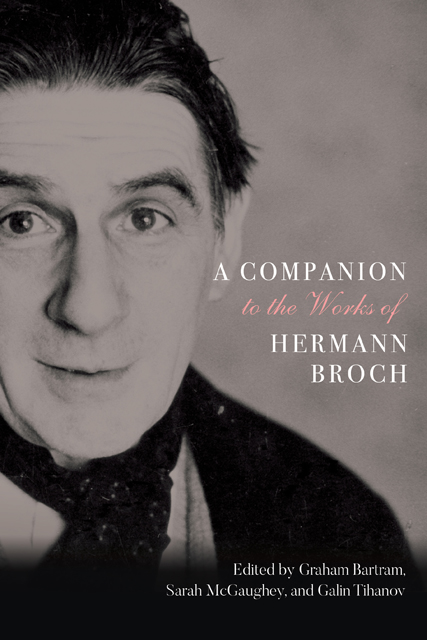Book contents
- Frontmatter
- Contents
- Preface
- Acknowledgments
- List of Abbreviations
- Introduction: Broch’s Life and Works
- 1 Perspectives on Broch’s Die Schlafwandler: Narratives of History and the Self
- 2 Hermann Broch and the Dilemma of Literature in the Modern Age
- 3 Interrogating Modernity: Hermann Broch’s Postromanticism
- 4 Broch and the Theater: Die Entsühnung and Aus der Luft gegriffen as Tragic and Comic Dramatizations of the Economic Machine
- 5 Limits of the Scientific: Broch’s Die Unbekannte Größe
- 6 Broch’s Die Verzauberung: Ludwig Klages and the Bourgeois Mitläufer
- 7 Hermann Broch’s Massenwahnprojekt and Its Relevance for Our Times
- 8 Human Rights and the Intellectual’s Ethical Duty: Broch’s Political Writings
- 9 Broch’s Der Tod des Vergil: Art and Power, Language and the Ineffable
- 10 From the “Tierkreis-Erzählungen” to Die Schuldlosen: The Creation of Broch’s Last Novel
- 11 Broch’s Legacy and Resonance
- Selected Bibliography
- Notes on the Contributors
- Index
7 - Hermann Broch’s Massenwahnprojekt and Its Relevance for Our Times
Published online by Cambridge University Press: 20 January 2023
- Frontmatter
- Contents
- Preface
- Acknowledgments
- List of Abbreviations
- Introduction: Broch’s Life and Works
- 1 Perspectives on Broch’s Die Schlafwandler: Narratives of History and the Self
- 2 Hermann Broch and the Dilemma of Literature in the Modern Age
- 3 Interrogating Modernity: Hermann Broch’s Postromanticism
- 4 Broch and the Theater: Die Entsühnung and Aus der Luft gegriffen as Tragic and Comic Dramatizations of the Economic Machine
- 5 Limits of the Scientific: Broch’s Die Unbekannte Größe
- 6 Broch’s Die Verzauberung: Ludwig Klages and the Bourgeois Mitläufer
- 7 Hermann Broch’s Massenwahnprojekt and Its Relevance for Our Times
- 8 Human Rights and the Intellectual’s Ethical Duty: Broch’s Political Writings
- 9 Broch’s Der Tod des Vergil: Art and Power, Language and the Ineffable
- 10 From the “Tierkreis-Erzählungen” to Die Schuldlosen: The Creation of Broch’s Last Novel
- 11 Broch’s Legacy and Resonance
- Selected Bibliography
- Notes on the Contributors
- Index
Summary
Known mainly to specialists who can read it in the original German, Broch’s Massenwahntheorie (Theory of Mass Hysteria)remains all but unknown to Anglophone readers. The notion that this voluminous and complex study might have something important to say to twenty-first-century readers is not on the radar even of those who have read and admired Die Schlafwandler or Der Tod des Vergil in English translation. In part because Broch’s almost completed Massenwahntheorie was not published during his lifetime, the study has not reached the wider audience it deserves. True, it takes willingness on the part of the reader to follow Broch’s dense and complex sentences, to say nothing of the special terminology he employed in his analysis.Despite these obstacles, however, Broch’s argument is urgent and compelling. Some of the book’s most original and exciting aspects await the attention of a larger readership.
In this chapter I shall argue for the continuing pertinence of Broch’s thought to the present day by focusing on his remarkable study of mass psychology. This reconsideration will concentrate on the status of the project as an independent contribution to the intellectual and political climate in the final years of the Second World War and during its aftermath.
Broch’s Massenwahntheorie is a broadly interdisciplinary venture. It contains insights from a number of different fields, not only crowd psychology but also ethics, religion, law, and economics.Above all, Broch understood his mass psychology as an integral part of his interests in human rights and the politics of democracy. This broader frame is one of the most significant features that distinguish Broch’s approach from that of other writers working on mass psychology before or during the postwar period. In this comprehensive project he created a working model that lived and breathed in its articulation of connections among many intellectual domains. In fact, for Broch there was really only a single overarching term for what he was doing: Wissenschaft.Given Broch’s intellectual disposition, this endeavor had an abstract and metaphysical cast; yet at the same time, the project was also designed as a contribution to a multifaceted understanding of the mass movements of the 1920s and 1930s.
- Type
- Chapter
- Information
- A Companion to the Works of Hermann Broch , pp. 143 - 158Publisher: Boydell & BrewerPrint publication year: 2019



